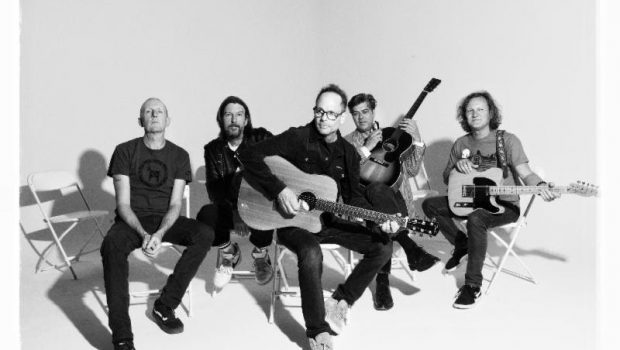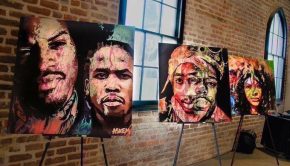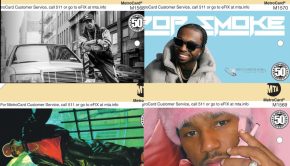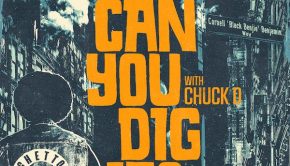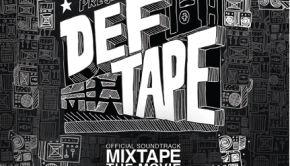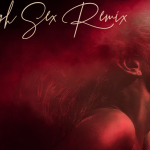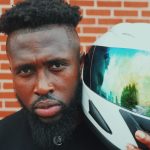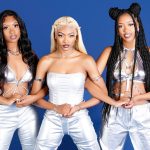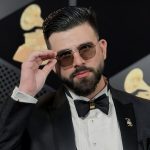The Gin Blossoms’ Robin Wilson On The Band’s Legacy, Big Star’s Influence & If He’s Met Chuck D
The Gin Blossoms — comprised of singer/guitarist Robin Wilson, guitarist Jesse Valenzuela, guitarist Scott Johnson, bassist Bill Leen and drummer Scott Hessel — first broke big with the multi-platinum album New Miserable Experience. The Arizona-based band’s streak of hits continued with 1996’s Congratulations… I’m Sorry, and even 2006’s Major Lodge Victory debuted on Billboard’s top 200 chart. In turn, with nine properly-charting radio singles to the quintet’s credit, The Gin Blossoms have managed to become valued as far more than a top “1990s alternative band.”
This summer The Gin Blossoms have been doing a mix of headlining shows, festivals, and co-headline shows with Collective Soul. The focus of many of the Gin Blossoms’ recent shows was the 25th anniversary of the earlier-mentioned New Miserable Experience album, which has been played in full every night. While touring is still being done in support of 2018’s Mixed Reality, next up release-wise is the New Miserable Experience Live two-disc set, which was filmed and recorded as part of The GIn Blossoms’ February 2019 performance at the House Of Blues in Chicago.
I had the pleasure of speaking with Gin Blossoms singer Robin Wilson by phone earlier this month about the past, present and future of the band. Below are transcribed highlights from the interview, while the full chat will appear as part of a future episode of the Paltrocast With Darren Paltrowitz podcast. In the meantime, more on The Gin Blossoms can be found online at www.ginblossoms.net.
On things turning around for The Gin Blossoms:
Robin Wilson: Probably around the mid-2000s we kind of realized that we had a pretty solid legacy… We were rebuilding our brand all through the 2000s and things didn’t really start to pick up for us again and so about 2011, 2012. In 2012 we went out on the Summerland Tour with Everclear and Sugar Ray and that’s when things really started to roll for us because we were in great company, we were in front of large audiences… What amazed me more than anything else on that tour is the other bands kind of looked to us as sort of leaders and we kind of set the standard for professionalism and performance. I remember being sort of amazed how much respect we were getting from our tourmates and how much more f**ked up all of those bands were than we were… (laughs)
In that company it seemed like we were really one of the more “together” partnerships and ever since then things have been getting better and better for us, in terms of the quality of the offers we’ve got and the size of the audience… It’s clear evidence of our legacy and our place in the grand scheme of things. I know that we’re like a mid-level band. I know where we belong in the grand scheme of things. We’re never going to be a Hall Of Famers with, so many other great bands that are gonna get there before us. But we were a part of the big story and of the big rock & roll songbook.
I’m extraordinarily proud of that and the fact that we’re still together after 31 years, and we’re making music as good as we ever have. We’re selling more concert tickets than we ever did. And you know we’ve kind of got our s**t together after all this time.
On being among the first bands to have an MP3-based digital album with the Gas Giants:
Robin Wilson: The record with Gas Giants, our record was available online as a download pretty early… We were with a label called Atomic Pop and they were the first — what you would call — “Internet-based label,” and they were really ahead of their time. It didn’t work out, the label ended up crashing by like 2000, but for a few years they really were ahead of their time… There were only three acts on the on the label, it was Gas Giants, Public Enemy and Ice-T.
On if he ever encountered former labelmate and fellow Long Islander Chuck D of Public Enemy:
Robin Wilson: No, actually I never got to meet Chuck. I did meet Ice-T a couple times but I never met Chuck and so I’m sure he’s only vaguely aware that he was on a label with a band called Gas Giants. He probably had no idea who I was. But I have plenty of Public Enemy on my iPod to this day.
On the influence of Big Star on The Gin Blossoms:
Robin Wilson: When we were first signed, we were given a shortlist of producers and we were asked, “What producers do you want to work with?” We threw out a lot of names, including Don Dixon and Mitch Easter, and Ed Stasium was another one that I really wanted to work with. But when we found out that the label was pushing John Hampton on us, they were working with him on another with another band of theirs. I remember the moment Jesse told me, “Well John Hampton’s the guy that recorded Tommy Keane and The Replacements and this is the studio that was built for Big Star.” And right then all of the other considerations evaporated. I remember saying to Jesse, “That’s the guy, let’s go record with John.”
To be a part of that legacy with Big Star, The Replacements… That was that was a really significant moment for our band and a turning point in our history, because John had a huge influence on us and he became one of my closest friends, a mentor and a brother and someone who I’m always going to remember as one of the more important relationships I’ve ever had in my life.
On his last words for the kids:
Robin Wilson: Well sure, kids, don’t do drugs, stay in school, rock away.

